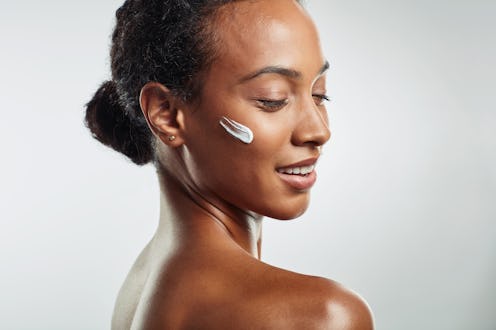(Skin)
Have Oily Skin? This Buzzy Ingredient Hydrates Without Leaving You Greasy
The more you know.

For those with oily skin, there’s always an elephant in the room when it comes to using a moisturizer: Will it leave behind a greasy residue? This may cause some people with oilier skin types to steer clear from moisturizer altogether (simultaneously sending derms into a frenzy), but for many, it’s just about finding the right product. Enter goat milk, a newly buzzy skin care ingredient that could be the answer to all of your complexion woes. It hydrates without contributing to the grease, plus it boasts a slew of other skin care benefits.
First things first, it’s important to get one thing out of the way: even if you have oily skin, you can still experience moisture loss. In fact, skimping out on moisturizer for fear it may lead to excess oiliness can backfire, as it can lead to dryness, triggering oil glands to produce even more oil to compensate for the lack of moisture. So if you haven’t found the right product to keep your skin moisturized without leaving you feeling even more oily, it might be time to give goat milk a try.
Goat Milk For Skin: Balancing & Exfoliating Benefits
Oily skin, sensitive skin, and acne-prone skin often go hand in hand. What makes goat milk such a star skin care ingredient for these skin types is its ability to provide balance for the skin’s microbiome. The makeup of goat milk has a similar pH to human skin (around 5.5), making it more tolerable and thus, less likely to be irritating overall. It’s also rich in fatty acids, which can help support the skin barrier and prevent moisture loss, says board-certified dermatologist Dr. Marisa Garshick. Translation: You’ll reap all the benefits of a hydrating formula without the slippery, uncomfortable feeling.
Some moisturizers can feel like they’re sitting on top of the skin versus absorbing into the skin — that’s because they’re likely sitting on a layer of dried-up skin cells, which can affect product absorption. Because goat milk contains lactic acid, an alpha-hydroxy acid, it’ll exfoliate the skin to get rid of those dead skin cells and, as a result, be quick-absorbing (when used in a moisturizer).
Speaking of exfoliation, celebrity aesthetician Joshua Ross of SkinLab explains that it’s a crucial step for oily- and acne-prone skin, as it can help the skin balance its levels of oil production, which can ultimately help reduce acne. Goat milk is a solid option as far as exfoliation goes because of the lactic acid it contains. “Not only does [lactic acid] help to brighten the skin, but it can also help prevent the pores from getting clogged as a result of dead skin buildup,” says Dr. Garshick. Lactic acid is also considered to be one of the more gentle exfoliants (versus something like glycolic acid), which makes it ideal for oily skin types that are also sensitive.
And, because goat milk has antibacterial and anti-inflammatory properties, it can help to reduce and improve the appearance of blemishes and breakouts (acne-prone skin, rejoice). As cosmetic dermatologist Dr. Mariana Vergara notes, goat milk is also a great source of vitamin A, and its antioxidant properties can help manage inflammation of the skin and also decrease the production of oil. Dr. Vergara also says that goat milk-infused cleansers are a great alternative to harsher, more aggressive formulas that tend to strip the skin of its natural moisture. “Goat milk is great because it gently removes dirt from the skin without disturbing the natural lipid barrier,” she tells TZR. “It also contains probiotics like lactobacillus which, has anti-inflammatory properties [and has been studied to improve severe cases of acne].”
Goat Milk For Skin: Minimal Side Effects
Though goat milk is considered a gentle ingredient, be mindful if you have a dairy allergy. Ross says that “anyone allergic to dairy should forego using skin care with goat milk ingredients, otherwise, it’s a system of trial and error — something that works for one person is not going to necessarily work for another.” Also, if you have severely sensitive skin, doing a patch test to make sure there’s no adverse reaction is always a good idea.
We only include products that have been independently selected by TZR's editorial team. However, we may receive a portion of sales if you purchase a product through a link in this article.
Beekman 1802 is the pioneer of goat milk skin care products, which is why it’s no surprise this fan-favorite has hundreds of five-star reviews. A probiotic complex caters to your skin’s microbiome for a youthful, radiant complexion while the texture is silky like butter — sans greasiness.
Here’s a multi-purpose goat milk-infused product that offers hydration in all the right places: lips, cuticles, skin, and even frizz. Goat milk is combined with shea butter, aloe, and avocado oil for a formula that’s worthy of becoming your new handbag go-to.
If you’re looking for a quick-absorbing moisturizer that doesn’t leave an oily film as a parting gift, turn to this one from Kate Somerville. It’s got goat milk, jojoba and avocado oils, and aloe to soothe, hydrate, and nourish the skin.
One bar of this soap is equivalent to one 114ml bottle of liquid facial cleanser. Impressive, especially when you consider the bar’s cleansing capabilities, using fatty acid-rich goat milk, hydrating avocado oil, and calming colloidal oats to get the job done.
Foaming facial cleansers can leave your skin feeling tight and stripped. That’s where this non-foaming one from L&I Apothecary Store comes in — it promotes even skin tone, wards off pimples, and leaves skin feeling smooth and supple.
This article was originally published on